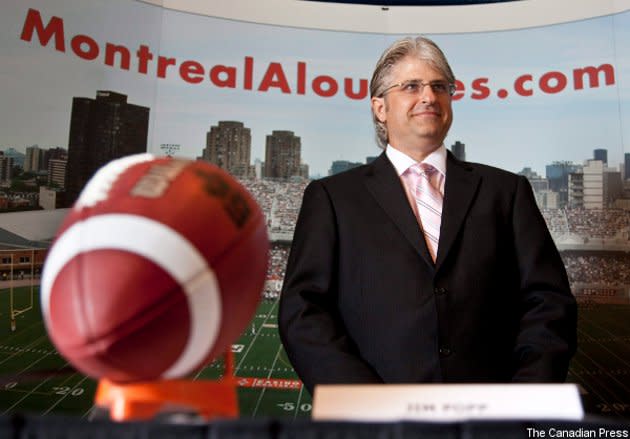How the Alouettes’ dynasty has been made
Just about every team in the CFL has gone through ups and downs over the last 15 seasons. That's not true for the Montreal Alouettes, though, as they've been riding sky-high almost since their return to the league in 1996 (and in fact, in the two years before that while they were based in Baltimore). They went 12-6 in their first year back in Montreal and 13-5 in 1997, and have never missed the playoffs since heading back to Quebec, but really took off after bringing Anthony Calvillo in during 1998. Montreal went 12-5-1 that year and 12-6 the next two seasons. The 9-9 2001 campaign was a relatively low point for them, but they rebounded to go 13-5 the next year and claim the 2002 Grey Cup. Since then, it's been mostly highs; Montreal's won the East in 10 of their 15 seasons in town and finished second in the other five and has claimed three Grey Cups during that time frame, tied with B.C., Calgary and Toronto for the most during that span. The architect of that prolonged dominance? General manager Jim Popp, who's been running the franchise's football side since 1994 in Baltimore and has gone 198-107-1 in Montreal. As he told The Hamilton Spectator's Scott Radley, it's not necessarily one particular thing that's led to success for the Alouettes, but the combination of all the factors that make up their approach:
He quickly points out there isn't one magic potion. It's a lot of things. But listen to him explain his methodology and you start hearing a few clues repeated over and over, presumably suggesting they're the keys.
His first step is surrounding himself with good, competent people in whom he has a ton of confidence and doesn't worry about them doing so well they usurp him. On his staff right now he has three former CFL GMs — Mike McCarthy, Marcel Desjardins and Alan Ford — who, for what it's worth, are all former managers of the Ticats.
You scout like crazy, draft good guys and then develop players within the organization so when guys go down with injuries or move on, you have pieces that can be plugged in and mesh with the chemistry of the dressing room. You look at the quality of the person as much as the quality of the athlete. Free agency has its place but isn't a cure-all.
"If those people don't gel together, it's going to affect winning and losing," he says.
You create as much stability as possible in a business that's far from stable. You have the same owner since 1997, the same GM since 1996 and the same quarterback since 1998.
Indeed, many will point to the Alouettes' quarterback as the crucial factor in their success, but this team's about more than just Calvillo. What's been perhaps most remarkable is Popp's continual ability to find remarkable depth, those "pieces that can be plugged in", and that's been a key storyline throughout the years. From Mike Pringle to Eric Lapointe to Jarrett Payton, Avon Cobourne, Brandon Whitaker and now Victor Anderson and Noel Devine, Montreal's had an incredible collection of talented running backs, and their receivers (Ben Cahoon, Jamel Richardson and S.J. Green, just to name a few) have been impressive as well. Popp always builds not for the moment, but for years down the line, and that's been crucial to Montreal's sustained success. What he's done through the draft has also been remarkable; the Alouettes have picked up plenty of key players that way, including Matthieu Proulx, Eric Deslauriers, Etienne Boulay, Jeff Perrett, Shea Emry, Andrew Woodruff, Luc Brodeur-Jourdain, Marc-Olivier Brouillette and Patrick Lavoie. Perhaps the key to Popp's approach is that he's obsessed with finding talent regardless of position, rather than specifically focusing on plugging particular holes. That's left the Alouettes with a huge amount of depth, which has enabled them to survive losses and stay consistently good. It's something other teams could learn from.



